K.A. Laity's Blog, page 156
March 21, 2011
This is Spring?
It's snowing here. First full day of spring?! Ay yi yi. Looks like Persephone is still struggling to leave the underworld, eh? I had some deadlines to meet and a few places to be over the weekend; consequently I have not yet managed to wrangle my photos online, so enjoy this video that visits the Borghese Gallery and gives you a close up of Caravaggio's and Bellini's works.
Did I remember to mention my new page at SoundCloud? A new place for readings and podcasts.
Did I remember to mention my new page at SoundCloud? A new place for readings and podcasts.
Published on March 21, 2011 05:50
March 18, 2011
March 17, 2011
BitchBuzz: Women's History Month WTFs
It's the middle of Women's History Month and we're facing some of the most aggressive attacks on women ever in this country, while people are overwhelmed by the terrible tragedies in Japan and the desperate battles for autonomy in the Gulf as people fight against dictators who have traditionally been propped up with help from our government. So you may find this week's column reflects some of that bitterness.
A Series of WTFs for Women's History MonthBy K.A. Laity
 "I do not wish them [women] to have power over men; but over themselves." — Mary Wollstonecraft, 1759-1797
"I do not wish them [women] to have power over men; but over themselves." — Mary Wollstonecraft, 1759-1797
It's Women's History Month and I have to say it depresses the hell out of me this year. I'm old enough to remember the second wave feminists, and all too well the backlash and splinter groups and the endless, endless "You've come a long way, baby!" smug pats on the back or behind. All of which tried to give the impression that we'd had enough already, missy.
Third wave feminists have re-energized the key issues, trying to keep the momentum going and forging bonds beyond class and beyond the borders of the privileged West. On many days, I can be hopeful, I can see the progress, I can admire all the men who do not see a woman's strength as a threat to his masculinity, all the parents who don't park their daughters in front of the Disney channel to brainwash them into Princesses, and I revel in being surrounded on a daily basis by charming, energetic, creative and awesomely smart women.
And then there's today, where I feel overwhelmed by the virulent attempts to shut women down in all possible ways. This is only a small part, but I've got a little list:
Read it here: http://news.bitchbuzz.com/a-series-of-wtfs-for-womens-history-month.html#ixzz1GrYHZhdQ
I also received the most sublime negative criticism from an academic peer: "the anti-academic tone is off-putting in the extreme" and "The author's desire to drug the audience seems self-aggrandizing." Seems?! Well, yeah! I'd like to think I am a Dalí-esque drug. I should explain that this was the paper I gave last year at the Alan Moore conference in Northampton. It was never meant to be a traditional scholarly paper: it was a performance about Moore's performances. The editors had intended to publish the proceedings and thought it fortunate that a newish journal expressed interest, though now that the journal has nixed several of the presentations, the editors are regretting that decision. C'est la guerre. Unless I can think of another place for it, I may just record it and make a video from the Powerpoint pres when I have a spare moment (which looks to be about July now).
With a little luck, I will get some pictures from Rome up tomorrow and tell a little more of my adventures. Promise! With the usual caveat that unexpected things keep arising...
A Series of WTFs for Women's History MonthBy K.A. Laity
 "I do not wish them [women] to have power over men; but over themselves." — Mary Wollstonecraft, 1759-1797
"I do not wish them [women] to have power over men; but over themselves." — Mary Wollstonecraft, 1759-1797It's Women's History Month and I have to say it depresses the hell out of me this year. I'm old enough to remember the second wave feminists, and all too well the backlash and splinter groups and the endless, endless "You've come a long way, baby!" smug pats on the back or behind. All of which tried to give the impression that we'd had enough already, missy.
Third wave feminists have re-energized the key issues, trying to keep the momentum going and forging bonds beyond class and beyond the borders of the privileged West. On many days, I can be hopeful, I can see the progress, I can admire all the men who do not see a woman's strength as a threat to his masculinity, all the parents who don't park their daughters in front of the Disney channel to brainwash them into Princesses, and I revel in being surrounded on a daily basis by charming, energetic, creative and awesomely smart women.
And then there's today, where I feel overwhelmed by the virulent attempts to shut women down in all possible ways. This is only a small part, but I've got a little list:
Read it here: http://news.bitchbuzz.com/a-series-of-wtfs-for-womens-history-month.html#ixzz1GrYHZhdQ
I also received the most sublime negative criticism from an academic peer: "the anti-academic tone is off-putting in the extreme" and "The author's desire to drug the audience seems self-aggrandizing." Seems?! Well, yeah! I'd like to think I am a Dalí-esque drug. I should explain that this was the paper I gave last year at the Alan Moore conference in Northampton. It was never meant to be a traditional scholarly paper: it was a performance about Moore's performances. The editors had intended to publish the proceedings and thought it fortunate that a newish journal expressed interest, though now that the journal has nixed several of the presentations, the editors are regretting that decision. C'est la guerre. Unless I can think of another place for it, I may just record it and make a video from the Powerpoint pres when I have a spare moment (which looks to be about July now).
With a little luck, I will get some pictures from Rome up tomorrow and tell a little more of my adventures. Promise! With the usual caveat that unexpected things keep arising...
Published on March 17, 2011 06:52
March 15, 2011
Madness & Montemartini
I am madly flailing today, so here's someone else's video at the Montemartini museum, which gives a nice sense of the unique place. I promise to get my pictures, video and adventures up soon!

Published on March 15, 2011 08:33
March 13, 2011
At last, Mr Hitchcock
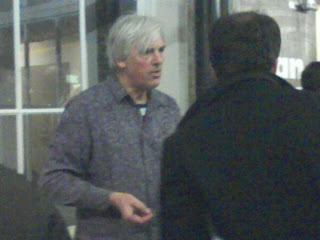
Last night Peg and I headed off in the direction of MassMoCA to catch Robyn Hitchcock and Joe Boyd perform their show Chinese White Bicycles , which links together readings from Boyd's memoir in the music business in the 60s and Hitchcock's performance of the songs from the artists including Dylan, the Incredible String Band, the Move, Fairport Convention and yes, Syd Barrett. Many of you know how much I adore Mr Hitchcock, but I've never had a chance to see him live because he always seems to be touring here when I'm in another country, and touring elsewhere when I come back. So squees a-plenty when I got tickets for this.
We stopped off at the Man of Kent pub for lunch then, on a whim, stopped at the Clark Art Institute where I have never managed to go. We caught the final day of the Dürer exhibit, which was delightful, then explored the rest of the museum which ended up having unexpected delights like Bouguereau's Nymphs and Satyr, Turner's Rockets and Blue Lights (Close at Hand) to Warn Steamboats of Shoal Water, and Monets, Degas and Singer Sargent, including his Fumée d'Ambre Gris.
By the time we got to MassMoCA, the exhibits had closed (I was hoping they'd keep them open a bit later because of the concert), so we wandered around the rolled up sidewalks of North Adams and then tried out the new rib place (good!) before wandering back and taking up our seats. It was not a sold out show, which amazed me, but what do I know.
I know I was grinning like an idiot when they came out, Hitchcock in purple trousers and his purple glasses and one of those wild shirts. From the start, Boyd's low-key delivery of pivotal moments from White Bicycles where his person history and rock history collided (meeting Dylan at breakfast with a young woman he'd hoped to bed) meshed well with Hitchcock's music, "setting the scene" as he said because like jelly it had to be. Boyd deflated some long-repeated mythologies -- he was there when Dylan went electric and no, Peter Seeger did not have an axe -- and Hitchcock infused familiar songs with renewed meaning. I haven't heard "Masters of War" in so long; it's easy to forget just how powerful it is. "Mr Tambourine Man" was magic and The Move's "I Can Hear the Grass Grow" a delight. In between typical Hitchcock banter both with the audience and with Boyd: "Interesting is a word with a lot of "i"s in it... okay, it starts off with two, but the more you look at it, it grows extras..."
Boyd had a lot of interesting behind-the-scenes stories, connecting the reborn Fairport Convention to their reawakening at The Band's Music from Big Pink, then relating how the guys from Los Lobos said they would have remained a bad heavy metal band had they not listened to Fairport and turned to their own folk music for inspiration. I don't know the Incredible String Band that well, but I loved Hitchcock's rendition of "Chinese White" and laughed at Boyd's story about how leaving the band alone in New York for three days while he flew out for business in LA ended up leading to their joining Scientology (and perhaps consequently derailing their career).
Boyd had been the owner of the influential UFO club, that really gave the big boost to the then unknown Pink Floyd. If you only know the post-Syd Floyd (as most people seem to do) you're missing out. The genius that was Syd Barrett! Boyd read his encomium to Barrett which appeared in the program for a tribute concert the two worked on. It brought tears to many eyes, including Hitchcock's and then he performed "Bike" which is a just about perfect song, and delighted everyone.
They signed copies of the book afterward, so I actually got extra squee. Joe Boyd liked my Ganesh scarf and I asked Robyn to sign my Moleskine, so now I can take a little inspiration with me everywhere. Happy sigh. Looking forward to reading the book, too!
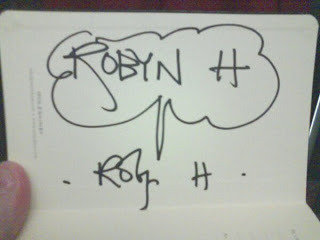
Published on March 13, 2011 07:02
March 11, 2011
Bella Roma
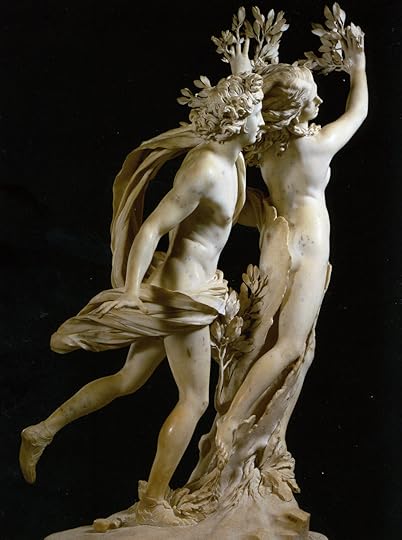 In the nineteenth century, wealthy Americans went on "The Grand Tour" of Europe, visiting famous historical and artistic sites and hoping to run into other wealthy Americans whom they might marry or titled aristocrats if they wanted a little more social cachet. Now we Americans run off for our ever-so-brief holidays and hope for nothing more than keepsakes. My eyes were the chief repository of keepsakes: the glory of Rome fills your vision and the colors of that golden afternoon light live in memory. The extraordinary blue of the sky, the yellows and oranges -- breathtaking!
In the nineteenth century, wealthy Americans went on "The Grand Tour" of Europe, visiting famous historical and artistic sites and hoping to run into other wealthy Americans whom they might marry or titled aristocrats if they wanted a little more social cachet. Now we Americans run off for our ever-so-brief holidays and hope for nothing more than keepsakes. My eyes were the chief repository of keepsakes: the glory of Rome fills your vision and the colors of that golden afternoon light live in memory. The extraordinary blue of the sky, the yellows and oranges -- breathtaking!The flight over from Philadelphia was not only sold out, but there was a large contingency from a Baptist college, including one ebullient young woman right behind me who could not be more excited about going to Italy. Fortunately I had earplugs so I could get some sleep -- once the grumpiest man in Italy changed seats with his wife so his very loud music didn't resound quite so harshly. Most folks tried to get some shut-eye on the flight, but some of the Baptists were too excited to sleep and kept up a steady stream of chatter, that I only heard when waking occasionally. I got enough sleep that while I was groggy on the first day, I was fine by the second. I bet the Baptists were dragging, however.
 How wonderful to land in a country for the first time and be greeted by friends :-) Alessandra and her son Edoardo met me outside customs and whisked me away to their lovely home. After a little refreshing, we headed out to the Baths of Caracalla, that gathering place of old Rome where Keats and Shelly found inspiration. You can see where the pools stretched out, hot and cold, gymnasium and more. Some of the mosaics remain, though most of the statues had been taken away to museums or homes long ago. It's a beautiful spot and like so many landmarks of the ancient world, nestling right in the heart of the busy city. In Rome the ancient and the modern live comfortably side by side. NB: Alessandra and Edo took these pictures. I find that the camera I borrowed from Catherine does not speak to Macs, so once I get that sorted out, I will post mine.
How wonderful to land in a country for the first time and be greeted by friends :-) Alessandra and her son Edoardo met me outside customs and whisked me away to their lovely home. After a little refreshing, we headed out to the Baths of Caracalla, that gathering place of old Rome where Keats and Shelly found inspiration. You can see where the pools stretched out, hot and cold, gymnasium and more. Some of the mosaics remain, though most of the statues had been taken away to museums or homes long ago. It's a beautiful spot and like so many landmarks of the ancient world, nestling right in the heart of the busy city. In Rome the ancient and the modern live comfortably side by side. NB: Alessandra and Edo took these pictures. I find that the camera I borrowed from Catherine does not speak to Macs, so once I get that sorted out, I will post mine.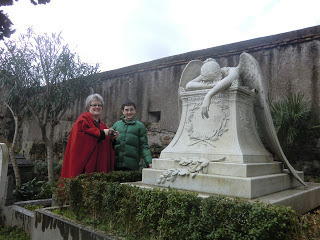 Not too far away lies the Protestant Cemetery, final resting place of both Keats and Shelley as well as other notables and home to many cats! There are cats all over the place in Rome, especially at burial grounds it seems. More on the cats later. We stopped by Shelley's grave which is also by Gregory Corso's and Shelley's friend Trelawney's. Nearby is the famous Angel of Grief. I suppose Edo and I look a little too happy here, but we were having fun despite the light rain. The beautiful spring flowers brought color to the greenery, especially the lovely violets on Keats grave. The cats peeked through the gravestones everywhere and the amazing pyramid overlooked the scene. It's quite a sight to see.
Not too far away lies the Protestant Cemetery, final resting place of both Keats and Shelley as well as other notables and home to many cats! There are cats all over the place in Rome, especially at burial grounds it seems. More on the cats later. We stopped by Shelley's grave which is also by Gregory Corso's and Shelley's friend Trelawney's. Nearby is the famous Angel of Grief. I suppose Edo and I look a little too happy here, but we were having fun despite the light rain. The beautiful spring flowers brought color to the greenery, especially the lovely violets on Keats grave. The cats peeked through the gravestones everywhere and the amazing pyramid overlooked the scene. It's quite a sight to see.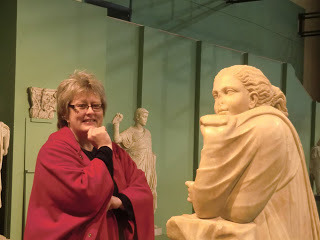 For a more unusual sight, we headed over to the Centrale Montemartini museum. Here's the thing: when you travel, be guided by one who knows. Alessandra seems to know everything about her beloved city, and can turn any corner and have something interesting to show you. I never got over my amazement at her encyclopedic knowledge! I usually have a good sense of direction, but Rome is such a sprawling organic tangle that I found it impossible to keep oriented, but delights permeate the city. One of them is this fantastic power station that's been turned into a museum. At first it seems incongruous to see classical statues from gardens and temples ranged in front of turbines. But these are the engines of our lives, both the practical and the creative. Here's me with the Muse Polyhymnia, trying to look thoughtful and inspired. Not too difficult! This trip has replenished my muses for sure!
For a more unusual sight, we headed over to the Centrale Montemartini museum. Here's the thing: when you travel, be guided by one who knows. Alessandra seems to know everything about her beloved city, and can turn any corner and have something interesting to show you. I never got over my amazement at her encyclopedic knowledge! I usually have a good sense of direction, but Rome is such a sprawling organic tangle that I found it impossible to keep oriented, but delights permeate the city. One of them is this fantastic power station that's been turned into a museum. At first it seems incongruous to see classical statues from gardens and temples ranged in front of turbines. But these are the engines of our lives, both the practical and the creative. Here's me with the Muse Polyhymnia, trying to look thoughtful and inspired. Not too difficult! This trip has replenished my muses for sure!Videos to come soon...
Published on March 11, 2011 10:22
March 10, 2011
Re-Entry: A Challenge
Hundreds of emails and more to wade through: bear with me and for the moment, enjoy this lovely photo Alessandra took of me at the top of the Spanish steps with my "Bright Star" badge from the Keats house and Rome behind me. Pictures, videos and more to come!



Published on March 10, 2011 07:53
March 2, 2011
Ciao, Bella!
Yes, I am off to Rome today assuming all goes well. I have my boarding passes printed and surely I will be all packed and ready (!). I am not taking a computer with me (gasp!) except for Ianto the iTouch (mostly so I have music on the flight). So, I'm not sure how much I will be online. So I'm going to put the Twitter feed here as that's an easy way to check in and if I can, you will see what I am up to. I'm returning late on the 9th and I'm sure I will have much to share upon my return. Arrivederci, America!

Published on March 02, 2011 04:07
March 1, 2011
Text as Art
Get a peek at the exhibit via the magic of video: choose your video outlet. We had a great time and it was fascinating to hear the genesis of the (all very different) projects. If you're in the neighborhood, drop by the Arts Center and check it out.
Text as Art from Kate Laity on Vimeo.
Phew -- so much to do today! Somehow it will all get done, somehow it will all get done, somehow...
Text as Art from Kate Laity on Vimeo.
Phew -- so much to do today! Somehow it will all get done, somehow it will all get done, somehow...
Published on March 01, 2011 05:32
February 28, 2011
Scarry Night: Miss Lonely Heart
 This is a flash piece for a challenge put up by the ever resourceful Patti Abbot: for the rest of the entries pop on over to her blog. The link was the line "I really don't mind the scars."
This is a flash piece for a challenge put up by the ever resourceful Patti Abbot: for the rest of the entries pop on over to her blog. The link was the line "I really don't mind the scars."She seemed so small at the big table, a drink with the palest hint of green beaded with sweat next to the flickering candle. His heart swelled. He knew he wouldn't tell her—at least not that night—that the emotion flooding his ventricles was protectiveness. She was so self-sufficient, what with her little candy shop and her scrupulously kept accounts.
He had seen them—and her—when he first figured out the clues. Her username ("candyheart") and her avatar (the gift-wrapped 1lb dark chocolate truffle box) added to her "self-employed" designation and a few casually dropped references to the chocolate trade. You didn't have to be Sam Spade to connect the dots.
"Tabitha?" He added the question mark to his voice in order to play the part of the uncertain swain.
She smiled. "It's you." Her hand thrust out awkwardly and he enclosed it in his large paw, feeling a surge of satisfaction that felt so primal, so right. It took all his strength not to enfold her in his arms at once. Calm down, you've got a lifetime.
The drink, she explained, was zubrowka, a kind of Polish vodka with some sort of grass in it. Normally he'd find such a thing unhygienic, but because it was her drink, he got one, too. The cold bite of that first sip sealed the night for him. He didn't usually drink but there was something so clean about the taste, he knew it was a sign.
Talk came easily, just as it had online. Over the flank steak Tabitha confessed, "I still think of you in my head as Number 7." The pink blush on her cheeks did something to his insides. They churned like hot taffy.
"It's not actually Number 7. It's Double O seven," he corrected her. "It's from a movie—actually a series of movies." The vodka made him feel expansive, he forgave her misunderstanding easily.
Her laugh tinkled like broken glass. "When you said it out loud, I remembered at once. James Band!"
"Bond."
She smiled. "That's the one!"
The bloody red of the steak as she popped it in her mouth increased the warmth he felt from her nearness and the drink and the night. "I have something to show you," he said feeling the heat a little too much on his brow.
"I know," she said, smiling yet, though her eyes grew serious.
He looked over his shoulder to assure himself no one else in the room was paying them any attention, then began to unbutton his shirt. For a moment, he hesitated, then pulled back the crisp linen to reveal the long welts across his chest.
Tabitha reached up her tiny hand to touch his skin. It was electric. He thought her tiny nails, varnished an innocent pink, somehow made the slender fingers even more delicately beautiful.
"I don't mind the scars," she murmured, turning her bright eyes back to her plate, a crimson flush rising up the back of her neck—visible even in the dim light of the restaurant. It foretold a sensuous nature.
"May I walk you home," he asked, his voice catching slightly as he slipped the raincoat over her small shoulders.
"Of course." Her bright eyes promised so much. Surely the path to her home would have some quiet corner where he could test that promise and take that little girl into his arms. When they crossed Pine at the corner and she pointed off toward Yates, he knew the right place.
"Can we step in here a moment?" He gestured to narrow behind the Chinese restaurant. His heart leapt into his throat. "I-I wanted to kiss you. I didn't know how to ask."
"Shhh," she said and took him by the hand. They walked into the passage and she turned her bright eyes up to him.
"You're so lovely, Tabitha." He rested his big hands on her shoulders. "So very lovely."
"And you're so delicious, Number 7," she said with a smile, her white teeth glinting in the dark.
"Double O seven," he chuckled.
"No, Number 7," she corrected him as her mouth dropped open and she sunk her teeth into his chest, tearing away a gaping hole in the flesh as he clanged back against the rubbish bin. Her grin transfixed him as she wiped the blood across her face and it dripped onto the raincoat. Quick as a lightning bolt she struck again, cracking ribs and growling. Then he saw it was his heart in her teeth, blood still furiously pumping out of it in all directions.
"I love you, Tabitha."
She popped the heart out her mouth with one tiny hand, bouncing it up and down as if weighing it. "I know, dear, I know."
Published on February 28, 2011 15:04



